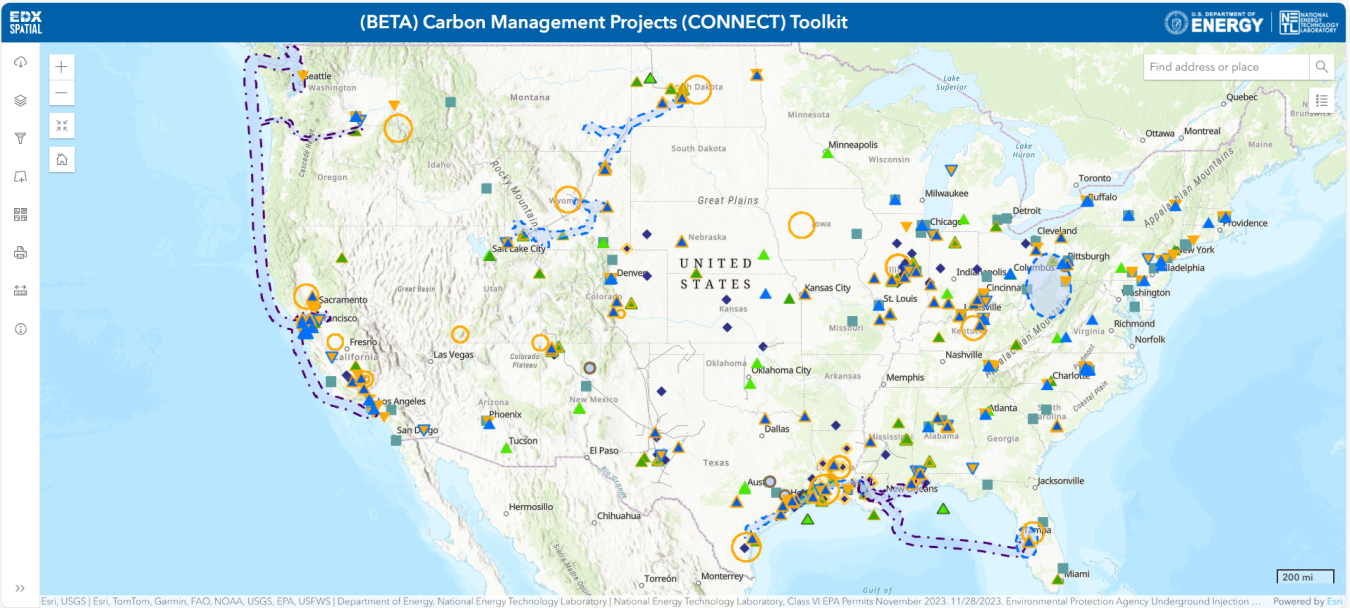As a part of broader efforts to support the United States in achieving a net-zero future, FECM is developing new tools and resources to provide transparency about carbon management funding and improve the public’s understanding of carbon management.
Office of Fossil Energy and Carbon Management
July 24, 2024The Biden Administration set an ambitious climate goal of achieving a net-zero emissions economy by 2050. The science is clear: carbon management is essential to meeting our climate goals and limiting warming to 1.5°C.
However, the United States will need to capture, transport, and permanently store hundreds of millions of tons of carbon dioxide each year in order to achieve a clean energy and industrial future by midcentury.
The work has already begun to meet this challenge.
Over the past two decades, the federal government has invested billions of dollars into more than a thousand carbon management projects across the country. These projects advance the research, development, and commercial-scale deployment of carbon management technologies and infrastructure and expand the United States’ carbon management capabilities to reduce harmful carbon pollution from industrial and power sectors and address climate change.
As a part of broader efforts to support the United States in achieving a net-zero future, the U.S. Department of Energy’s (DOE’s) Office of Fossil Energy and Carbon Management (FECM), in collaboration with other federal agencies, is developing new tools and resources to provide transparency about carbon management funding and improve the public’s understanding of carbon management.
What is Carbon Management?
Carbon management is used here to describe a variety of technologies and practices that reduce carbon dioxide emissions, including:
- Point source carbon capture: capturing carbon dioxide from industrial facilities and power plants
- Carbon dioxide removal: removing carbon dioxide directly from the atmosphere
- Carbon transport: transporting carbon dioxide from where it is captured to where it can be geologically stored or put to beneficial use
- Carbon storage: storing carbon dioxide safely and permanently in geologic formations
- Carbon conversion: converting captured carbon emissions into useful products
Carbon management is necessary to help reduce current carbon emissions to net-zero by midcentury and ultimately remove carbon dioxide already in the atmosphere as a result of past emissions. However, carbon management is complementary to, and cannot replace urgently needed expanded and parallel efforts to reduce emissions through aggressive deployment of energy efficiency, renewables, nuclear power, clean hydrogen, and other clean energy and industrial technologies and measures.
Carbon Management Projects and Investments
This month, FECM launched the Carbon Management Projects (CONNECT) Toolkit, an online mapping tool and database that provides details about carbon management projects, such as the funding status and amount, location, sources of carbon dioxide emissions, and many other project details. This serves as a single source of authoritative information to the public on key federally funded carbon management projects.
The CONNECT Toolkit also offers relevant information on other federal initiatives, regulatory permits, natural resource potential, existing infrastructure, point-source emissions, socio-demographic indicators, and protected lands.
Learn more and explore the CONNECT Toolkit here.
Carbon Management Resources and Science-Based Information
Work by the Intergovernmental Panel on Climate Change and broader scientific consensus is clear about the importance and necessity of carbon management for reaching climate goals. However, FECM understands that the public, communities, and other impacted stakeholders need access to information grounded in science to better understand carbon management technologies and to represent themselves in project development conversations.
FECM has created the Carbon Management Resource Portal to provide stakeholders with a place to learn about the rapidly evolving field of carbon management. The Carbon Management Resource Portal includes:
- Information on the different carbon management technology areas for different knowledge levels,
- Fact sheets, reports, research articles, and videos on carbon management technologies, and
- Research authored by DOE, independent experts, and other external resources.
Check out the Carbon Management Resource Portal and learn more about carbon management technologies.
Learn More
To learn more about how FECM is supporting the advancement of carbon management, sign up to receive email updates and follow us on X, Facebook, and LinkedIn.


